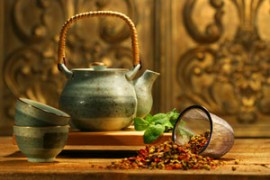Chinese herbal medicine, also known as Chinese herbology is one of the primary modalities within the scope of traditional Chinese Medicine. Chinese herbology includes treatment with substances such as plants, roots, minerals and more. Like acupuncture, Chinese herbology has evolved as an integral part of Chinese medicine and is used to re-harmonize imbalances in the body.
Chinese herbal medicine is the practice of combining individual herbs into customized formulas to promote health and well-being. The Chinese pharmacopoeia lists over 6,000 different medicinal substances in terms of their properties and the disharmonies with which they are helpful, but only about 400 are in common use. The World Health Organization (WHO) defines herbal medicines include herbs, herbal materials, herbal preparations and finished herbal products that contain as active ingredients parts of plants, or other plant materials, or combinations. Although a single herb is sometimes used, a combination of herbs, typically five to fifteen, is more common.
The unique characteristic of Chinese herbal medicine is the degree to which formulation is done, in order to meet the needs of the symptoms. The variety in temperature and taste give herbs – the properties that influence the yin and yang energy patterns of the body. There are herbs that will warm, herbs that will cool, herbs that will tonify, and herbs that will bring you out of stagnation. Chinese formulas are comprised of herbs designed for each individual patient. This special formulation is crucial because these formulas must be delicately composed for the purpose of achieving balance in each disharmonious state of being. Even small deviations in dosage or herb composition can change the entire focus of the formula and therefore, the results. Usually, herbs are combined in formulas and given as teas, capsules, tinctures, or powders.


